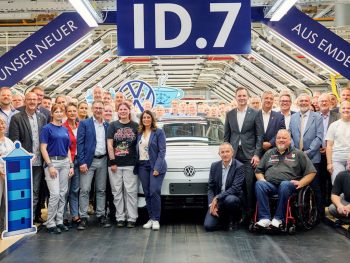Volkswagen ID.7 electric saloon enters production
Volkswagen has officially started production of its ID.7 electric saloon ahead of its launch in Europe this autumn.
The news was revealed in a social media post celebrating the “symbolic start of production” of the new model at the Emden plant in Germany, following the launch of a small production run in June.
Thomas Shafer, CEO of Volkswagen passenger cars, said: “The ID.7 is a top car from a top team. A big compliment to all our colleagues in Emden who have been so active in making the start of production a full success. Thanks everyone for your commitment!”
Revealed earlier this year, the ID.7 is pitched as a “comfortable limousine for long distance travel”, opening up a new segment in the ID family and indirectly replacing the Passat and Arteon.
It’s designed to combine “long ranges, fast charging, spacious interior and intuitive operation”.
A rival to the Tesla Model 3 and Hyundai Ioniq 6, it will deliver up to 700km (435 miles) of range along with charging rates of up to 200kW.
Two variants will be available: an entry ID.7 Pro model with a 77kWh battery that gives up to 615km (382 miles) and a Pro S derivative with an 82kWh pack for the headline 700km range. Both feature a rear-mounted 286hp single motor that’s newly developed and is the most powerful and highest-torque electric drive motor in a Volkswagen ID. model so far. A dual-motor four-wheel drive will arrive later on.
The Emden plant is building the model exclusively for the European and North American markets, following investment of more than one billion euros since 2019 to convert the site for e-mobility production.
The ID.7 is one of 10 new electric models that Volkswagen will launch from 2023 to 2026. Other arrivals include the new ID.3 and the long-wheelbase ID. Buzz launched this year, which will be followed by a compact electric SUV in 2026 and the production version of the ID. 2all – which will be priced at less than €25k (around £22k). Volkswagen says this will give it the widest range of electric vehicles compared with its competitors. It’s also aiming to achieve an electric car share of 80% in Europe by 2030 ahead of plans to only produce electric vehicles in Europe by 2033.


